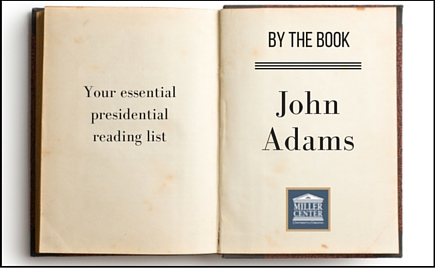By the Book: John Adams

The first year of a new president’s first term is always a crucible. But often it’s only in hindsight, within the carefully considered pages of an authoritative presidential biography, that the full measure of that first year can be taken. In this new series on the best presidential biographies, Miller Center presidential scholars and experts recommend the ones most worth reading.
How do you follow George Washington? It is difficult. John Adams’ presidency is lesser known for that reason, but also for the fact that he had serious first year crises like the French Revolution and heightened partisanship, a bitter election failure, plus the Founding Father giant, Thomas Jefferson, serving right after him. Adams’ presidency is a fascinating case study in trying to balance security and liberty.
It took awhile before scholars began to see Adams’ importance to the presidency. Page Smith, in 1962, put Adams back into the spotlight with the thorough, two-volume work John Adams.
The modern biographies continue Page’s efforts. John Ferling’s John Adams: A Life and John Patrick Diggins' John Adams are thoughtful books as they try to entangle the pro-Jefferson biases.
Pulitzer-Prize winner, Joseph J. Ellis wrote Passionate Sage: The Character and Legacy of John Adams that captures Adams' unique personality. The most popular single-volume biography is David McCullough’s book John Adams, of course. However, it is not without its criticism. McCullough relied heavily on Adams family papers, so he did not flesh out his subject beyond Adams’ own point of view.
It is worth reading the Adams and Jefferson letters, and the best source for that is The Adams-Jefferson Letters: The Complete Correspondence between Thomas Jefferson and Abigail and John Adams, edited by Lester J. Cappon.